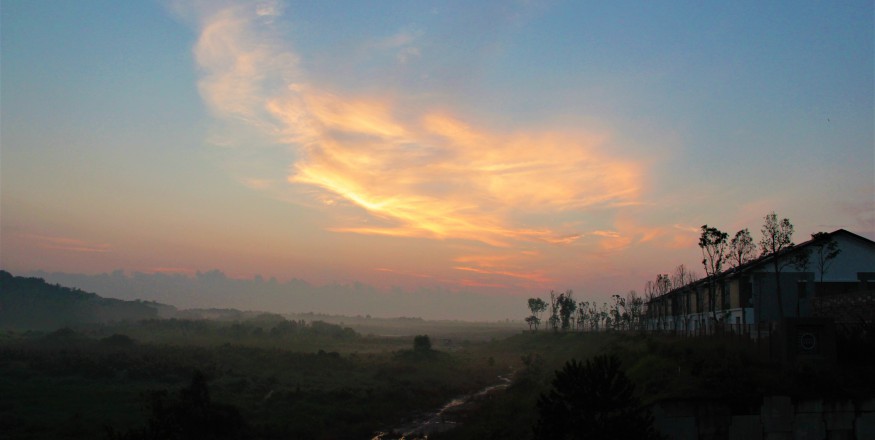Their first day in Venezia truly began when they sat on the steps of Chiesa San Simeon Piccolo, finishing the croissants they had bought an hour earlier from a nearby bakery. Cay let out a soft moan at the wheat-based breakfast, licking the flakes from his fingers. Judas, meanwhile, was focused on the sunrise. It looked like a floating orange yolk slowly lifting away from the egg-white city below.
Their quiet morning was interrupted by the sounds of a local man unloading goods from a small boat. The man hauled sacks of potatoes and crates of vegetables onto the raised pavement beside the Grand Canal. Judas looked like he wanted to help—though the man seemed neither burdened nor relaxed. Cay, too, was fixated on the movement, silently acknowledging the man's rhythm and effort. They were so transfixed that they barely noticed the sun rising fully above the horizon.
After finishing their water and tossing the paper bags into a nearby bin, they began walking toward their accommodation in the eastern part of the island—about a 50-minute journey on foot, if they stuck to their GPS route.
“You know, Suju gave us instructions to get there more easily,” Judas reminded him.
“I know. But it’s still early—he did say we could arrive anytime in the morning.”
Suju was the hostel owner where they’d be staying for the next three days. Judging by his profile picture, he had Middle Eastern features: a prominent nose, curly dark hair, and sharply defined lips, reminiscent of many from the Arabian Peninsula or surrounding regions. “The name suggests it,” Judas once noted. Suju had even offered to pick them up halfway if they followed his directions.
“I don’t like this. Why couldn’t we just go directly there instead of waiting somewhere?”
“Maybe he’s just being friendly,” Cay said, sensing Judas’ concern.
“We’ll just head to the meeting point. I was just a little worried, that’s all,” Judas replied, standing up.
“Yeah, at least this way we get to see more of the city. Better than taking a water bus,” Cay snorted as he rose.
They made their way past a cluster of tourist-oriented restaurants lining both sides of the broad, car-free street. Venezia prohibited land vehicles, except for public buses near Stazione di Venezia Santa Lucia. Only the bakeries had opened early, their interiors glowing with vivid yellow light, welcoming workers and tourists alike with warm coffee and fresh bread. The restaurants, on the other hand, had their umbrellas folded, their metal chairs stacked neatly against the walls—indistinguishable from one another, save for minor design differences.
Seeing people in business suits walking through the empty streets felt strangely out of place. Cay had always imagined Venice as a city overrun by tourists and shopkeepers—but now realized how social media had shaped his naive expectations.
“How naive I am,” he whispered to himself, cheeks slightly flushed. Judas may have heard him, but didn’t ask. He was used to Cay’s stream-of-consciousness remarks.
They eventually reached the meeting point, thanks mostly to their GPS after getting lost in Venezia’s maze-like alleys. They waited until the short, scruffy-faced figure of Suju emerged from down the block, waving with a faint smile.
If life were just a picture, it would have no meaning. It was the act of painting—the process itself—that defined a person. We all live differently, but we end the same: in death. So the finished work was never what made life beautiful. It was the making, the shaping, the struggle.
At fourteen, Cay did not see himself as average. Despite his insecurities—his broad body, his slightly upturned nose, his small Asian eyes—he still believed he was here for a reason.
Mistakes, he thought, were just part of the human process. Even the most insignificant people contributed in some way. He believed he had a purpose, though he didn’t know what it was. He just had to wait. And survive.
Madness, to him, wasn’t doing the same thing repeatedly hoping for a different result. And safety didn’t mean your condom couldn’t break. Cay believed the point of life was to have faith in yourself. What else could you rely on?
His self-loathing was, in some ways, a contradiction. But he thought of it as a cleansing—breaking down the flawed self to eventually transcend it. He believed that through conflict and confusion, one could reach a truer version of themselves.
“Keep on running, fatso,” someone had once yelled during P.E., as the class jogged in two long lines—boys and girls—across the school’s grassy field.
Cay smiled at the insult, masking the sinking feeling of shame and resentment, and kept running.
He hated those physical education days. They required students to change into black shorts and tighter uniforms that revealed far too much. He always felt his classmates staring, even when they weren’t. His protruding belly, large thighs, and round backside made the shorts stretch in awkward ways.
Maybe it was that kind of hyperawareness that gave Cay his ability to read people. Maybe it was just paranoia. Either way, he was usually right. But what he wanted more than anything was to lose weight. The problem was—he didn’t know where to begin.
The popular boys in class wouldn’t include him in basketball games. Others were too unfamiliar or lived too far away to befriend. Communication was always a hurdle. Every interaction felt like an uphill climb.
Maybe this is my purpose, Cay thought. To begin the journey—to find his path. Whatever the cost, it wouldn’t outweigh the effort and growth required to reach it.
He often fantasized about a fitter, more attractive version of himself. A future where he no longer had to shrink away in shame.
These thoughts drifted in his mind during lunch, halfway through his cafeteria meal. He noticed how slowly he was eating, lost in the comfort of imagination. In that imagined world, he wasn’t judged—he was admired. And in that moment, he needed nothing else.
ns216.73.216.176da2

































